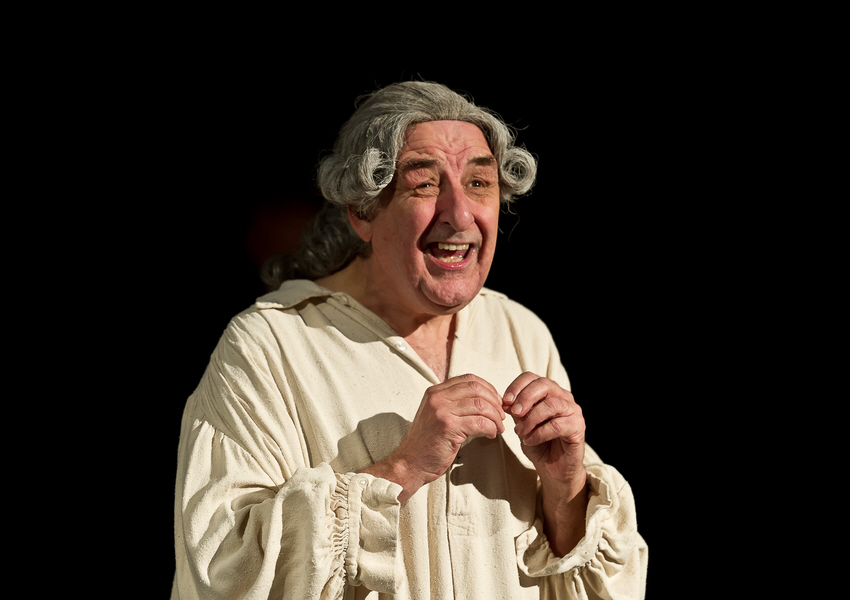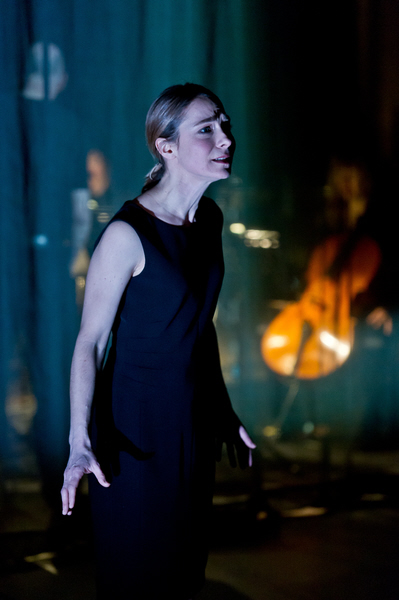Royal Welsh College of Music and Drama, Cardiff, 27th March 2013
Ping – music: Vasco Mendonça, words: Samuel Beckett, video: Sandro Aguilar
Eight Songs for a Mad King – music: Peter Maxwell Davies, words: Randolph Stow, George III
Conductor: Michael Rafferty
Director: Michael McCarthy
Designer: Simon Barnham
Lighting: Ace McCarron
Ping – Actress: Nia Roberts, Singer: Helen-Jane Howells
Eight Songs for a Mad King – King George III: Kelvin Thomas
As part of their twenty-fifth birthday celebrations, Music Theatre Wales has revived one of the most iconic British compositions in any genre of the last fifty years, Eight Songs for a Mad King, by Peter Maxwell Davies. The piece was premiered in 1969 to opposing roars of enthusiasm and protest that were as nothing beside the howls of its tormented protagonist, George III; today, the extremes of expression traversed in the piece – going beyond even Schoenberg’s Erwartung and the directly inspirational Pierrot lunaire – may no longer be so unfamiliar or disturbing on a musical level, but Max’s superlative depiction of the monarch’s mental fragmentation and descent into untrammeled insanity still has the power to shock.
Max was in his mid-thirties when he embarked upon Eight Songs, still considered to be an enfant terrible and about to change the face of British music through the addition of percussion (as well as harpsichord) to Schoenberg’s 1912 Pierrot quintet of flute, clarinet, violin, ‘cello and piano; as Paul Griffiths noted, ‘hey presto, an ensemble was born, one that goes on ricocheting through contemporary music.’ The piece was first produced by Music Theatre Wales (then Cardiff New Opera Group) nearly thirty years ago with tonight’s very soloist, Welsh baritone Kelvin Thomas, as the King; a role he has since made his own with countless acclaimed performances around the globe, adapting a fearsome vocal part which includes chords as well as Sprechstimme and a range of over four octaves (written for the extraordinary Roy Hart). During that time, Max has cemented his status as a leading British composer of his generation, accepting a CBE, then a knighthood and – either fittingly or ironically, depending on one’s viewpoint in the light of Eight Songs for a Mad King – the position of Master of the Queen’s Music in 2004. MTW itself (of which he is Patron) is currently riding high; this year alone they have won a South Bank Sky Arts Award for Opera for a joint production with Scottish Opera of Ghost Patrol by Stuart MacRae and, on the very day of this performance, learned of their nomination for an Olivier award for the double-bill which combined MacRae’s opera with Huw Watkins’s In the Locked Room.

in Eight Songs for a Mad King
photo: Clive Barda
First on the programme tonight came a piece demonstrating MTW’s continued remit to explore new work; the UK premiere of Ping (2011) by the Portuguese composer Vasco Mendonça, whose birth in 1977 also puts him in his mid-thirties at the time of composition. Mendonça is no enfant terrible but, otherwise in common with the Max of yore, he is a serious and highly capable composer of great promise. The two works made an excellent pair and a fascinating bridge across the generations, showing complementary yet diverse approaches to the worlds of music theatre, language and performance. Ping also depicts the worsening mental state of its protagonist; in this case, by means of multimedia – a trend which has been gaining momentum across Europe and the UK as increasing numbers of composers and performers combine video or other visuals with acoustic and/or electronic music, often in a theatrical context as Mendonça does here.
The video in Ping was commissioned from film maker Sandro Aguilar and the text is the short story of that title by Samuel Beckett (published in French as Bing in 1966, then in English a year later – around the time Randolph Stow created the libretto for Eight Songs utilising quotations from George III himself). The piece was beautifully staged and exceptionally well executed, making the most of an ideal theatrical and acoustical space. In this production, director Michael McCarthy chose to split the solo part between two performers to great effect, with a singer (Helen-Jane Howells in clear, pure voice) ‘ghosting’ the actor/narrator (an equally impressive Nia Roberts) from behind a semi-opaque gauze curtain onto which was projected Aguilar’s flickering black and white patterns. This latter worked with the diffused electronic sounds to create a feeling of internal white noise or static entirely pertinent to the flux of Beckett’s short, repeated phrases and fractured syntax. Also visible behind the gauze were the ensemble of two clarinets, violin, ‘cello and percussion (conducted by Michael Rafferty) from whom emanated music of exquisite lightness and textural plasticity which sought not to ‘interpret’ or ‘enhance’ the Beckett, but rather paralleled its emotional resonances in the most subtle way – in co-witness with the audience, as it were, to the protagonist’s increasingly frustrated recycling of episodic memories.

in Ping
Photo: Clive Barda
Beckett’s monologue has its own verbless, compressed ‘music’ and has been aptly described by Mary Catanzaro as forcing the reader to ‘attend to a linguistic form in which a non-traditional, musical representation of a narrative text undermines the traditional, humanist notion of identity and cracks open the illusion of an autonomous, centered “self”.’ This process of defamiliarisation evidenced by – as Mendonça himself puts it – ‘the impossibility of language’, is classic music theatre territory and is directly traceable to the European heyday of the genre from the sixties to the eighties. Composers such as Luigi Nono, Luciano Berio, Hans Werner Henze, Mauricio Kagel and, here in the UK, Vic Hoyland and David Sawer (continuing in part with the latter and, especially, with Roger Marsh among others), explored a deliberately un-operatic aesthetic involving an experimental, Dadaist notion of performative art drawn from influences as diverse as the impersonal Japanese Noh theatre, cabaret, political radicalism and the Theatre of the Absurd – of which Beckett, of course, was a prominent example.
Max’s Eight Songs is clearly allied to this tradition by virtue of its ‘distanced’ yet extreme Expressionism, lack of straightforward narrative, broken chunks of text and use of alienating theatrical devices (not least the King’s shocking destruction of the violinist’s instrument at the work’s climax in Song 7). But, at root, the piece belongs to a more conventionally operatic tradition in that it seeks to illicit our sympathy for the delusional King, projecting his mental state through the music itself in a way which seeks to describe or expound that mental state – much like the music in a conventional opera would. The King’s alternate screechings and whisperings are not a semiotic exploration of the limits of language but, rather, a straightforwardly realistic – albeit horrifying – portrayal of a mind in utter breakdown; his attempts to locate himself as he reaches out to his beloved birds are psychologically ‘real’, not a questioning of the nature of identity itself.
Thanks to the compelling rendition of the role by Thomas and the musical expertise of the ensemble under Rafferty, tonight’s performance was a moving experience. However, it was not as shattering as it might have been. After the wonderful coherence and balance of Ping, the lack of substance in the direction here was disappointing, with little help given to the soloist by means of dramaturgy, lighting or even costume; ironically, the result of such a ‘hands-off’ approach was to lessen the impression of the King’s tragic isolation as Thomas was in danger, at times, of becoming the focal point of an essentially supportive ensemble rather than trapped alone inside the birdcage of his disintegrating mind.
Such things matter if productions of the piece are to remain true to the sheer visceral intensity of Max’s vision. In 1969 when the piece was written, it was a mere ten years since the 1959 Mental Health Act had outlawed promiscuity or other ‘immoral’ conduct alone as grounds for detention – which gives some inkling as to the archaic attitudes to mental illness still remaining at that time (and which continue to surface today in various ways). The piece is an enduring testament to Max’s compassion and willingness to take a stand on social issues. Given the heartbreaking inability of the King to communicate, it seems fitting that his groundbreaking vocal athletics are so eloquent in communicating the pathos, horror – and occasional lucid wit – of his affliction. But more was needed here from the production in dramatic terms to fully realise the nightmare of that affliction and raise the bar to excellence overall.
Banner illustration by Dean Lewis










